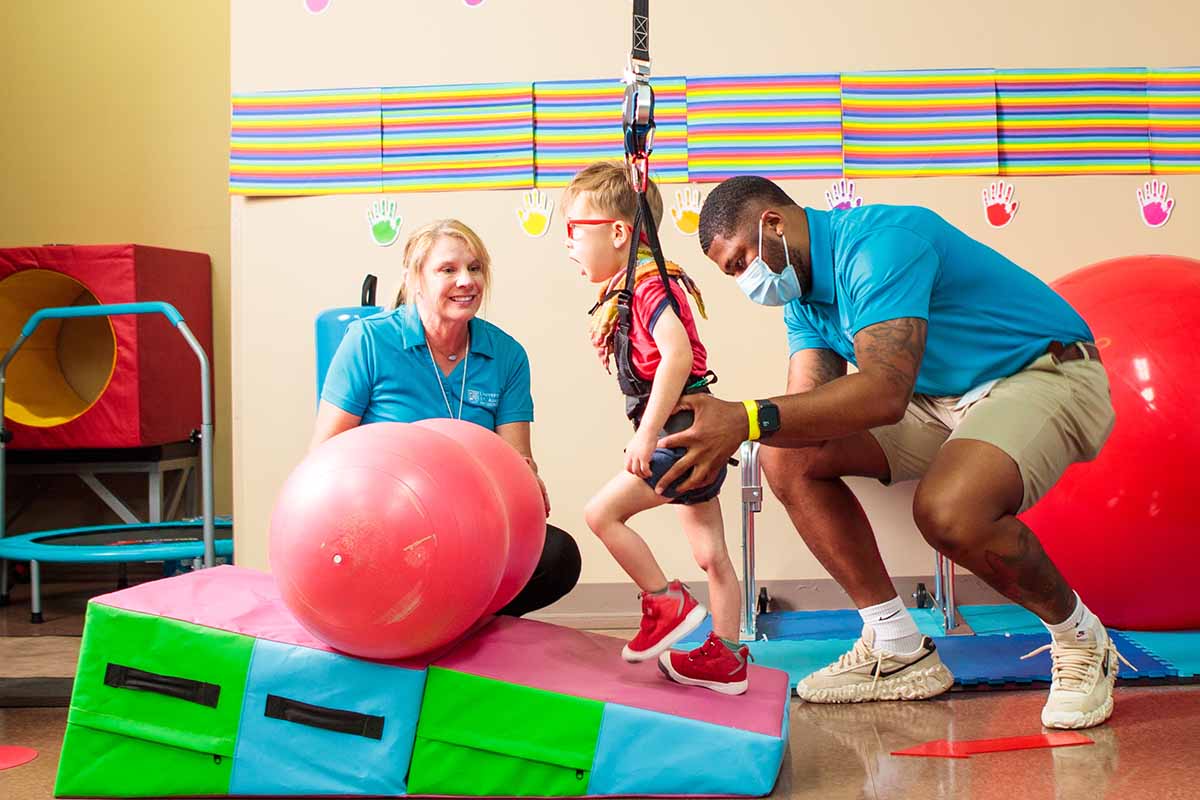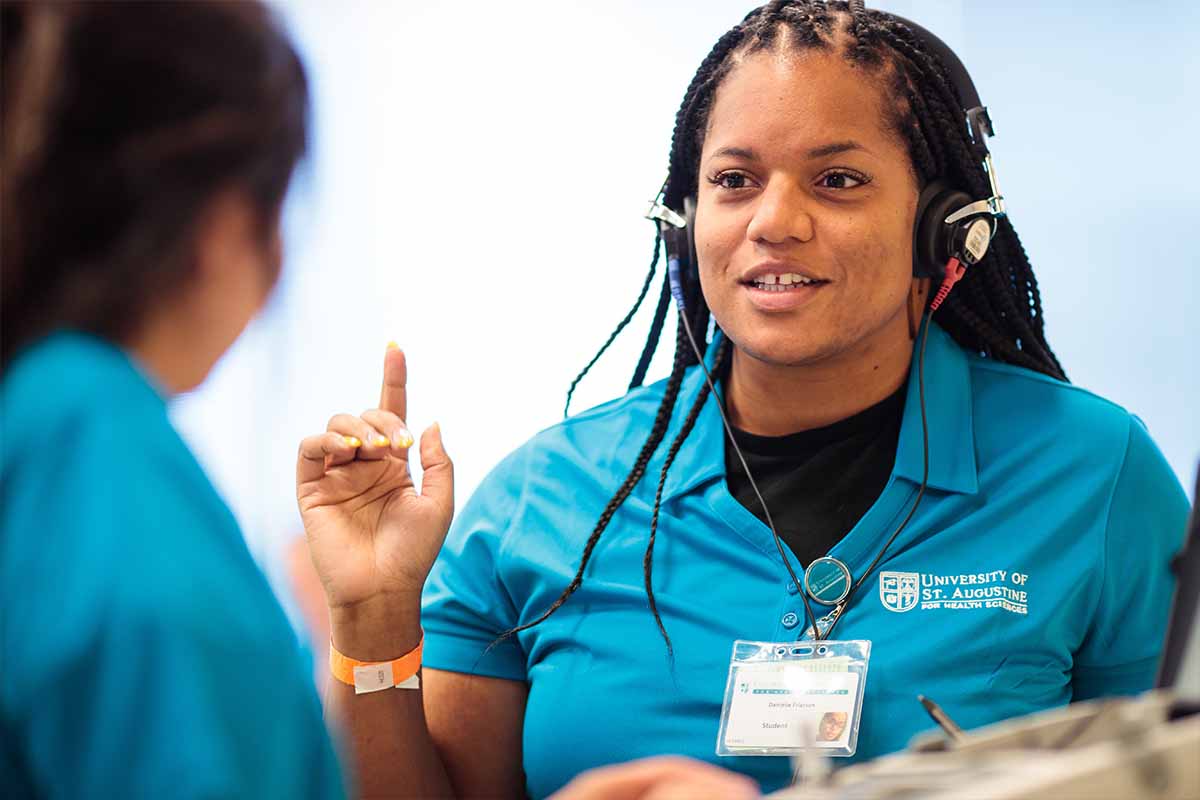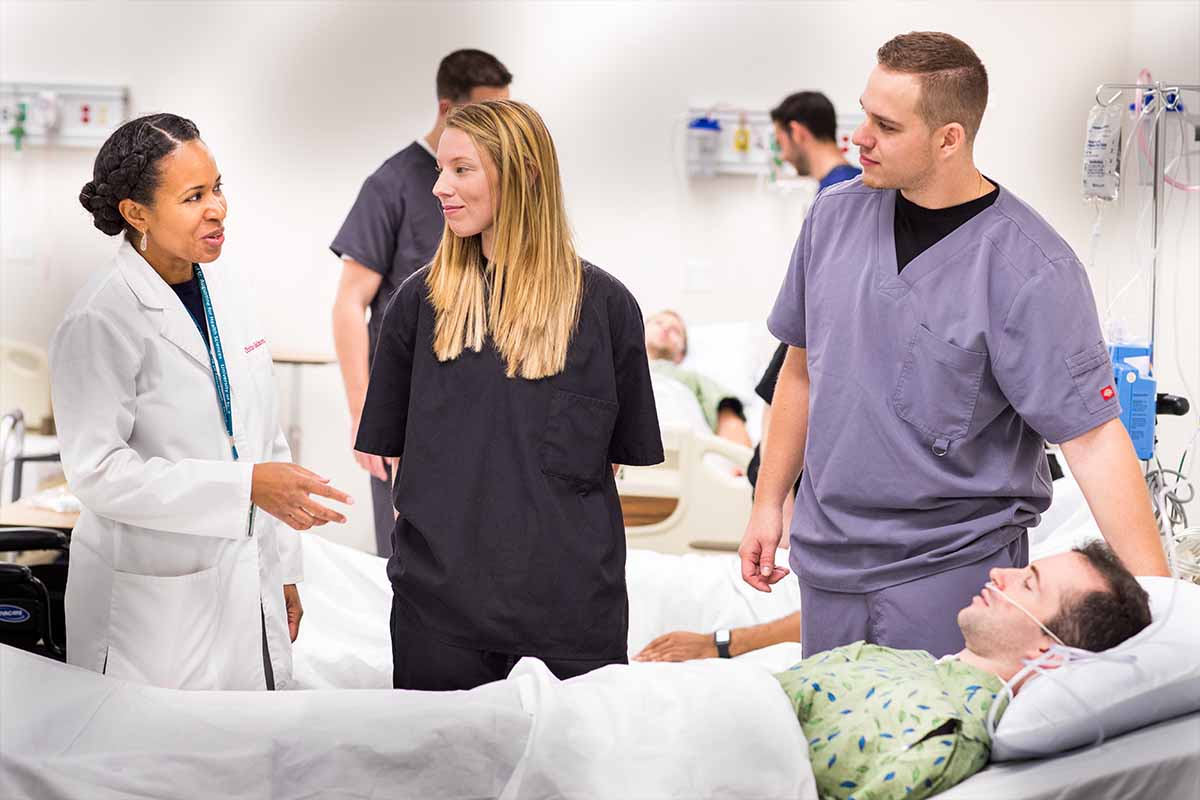

You’ve earned your Bachelor of Science in Nursing (BSN) or are planning to pursue the degree. What’s your next step?
You may begin work in a healthcare setting or continue your education and expand your credentials by earning a Master of Science in Nursing (MSN).
Earn your MSN to create more career opportunities in the healthcare system. Learn how to take your BSN to an MSN, about available role specialties and important admission requirements.
Table of Contents
- What Is a BSN to MSN Program?
- Why You Should Get Your MSN
- MSN Role Specialities
- BSN to MSN Curriculum
- How Much Does a BSN to MSN Program Cost?
- BSN to MSN: How Long Does It Take?
- MSN Program Admission Requirements
What Is a BSN to MSN Program?


An MSN program helps students with a BSN grow their education and advance their careers. MSN programs allow students to choose a clinical or non-clinical role specialty where they can hone their skills through coursework and/or clinical intensives.
The University of St. Augustine for Health Sciences (USAHS) MSN program prepares students for advanced clinical practice and leadership careers. USAHS equips students with the tools, strategies and skills necessary for higher-level roles.
USAHS also offers a BSN-entry Doctor of Nursing Practice (DNP) track for two role specialties: Family Nurse Practitioner (FNP) for students interested in advancing in clinical practice and Nurse Executive for students interested in healthcare leadership.
Why You Should Get Your MSN


Earning your MSN will improve your knowledge and skills in a nursing field and expand the types of roles you can apply for post-graduation. Below are a few more benefits to earning your MSN:
- Higher salary: You can expect higher compensation benefits throughout your career with an MSN. The annual average salary for an MSN graduate is $102,000 though your salary will also depend on location, years of experience and role specialty.1 *
- Role specialty: USAHS offers five role specialties within the MSN program, leading to a wide variety of advanced career opportunities in healthcare.
- Higher education: Earning your MSN will deepen your knowledge in the nursing field and refine your skills. You can also choose to continue your education and pursue a DNP. USAHS offers an MSN-entry DNP curriculum track that prepares you for advanced nursing practice.
- Leadership opportunities: Whether you choose a clinical or non-clinical role specialty, your MSN will prepare you to become a leader in your field. However, choose a role specialty like Nurse Executive to gain communication and critical thinking skills necessary for higher leadership and management roles in a healthcare setting.
- Health advocacy: With an MSN, you’ll continue to improve your patients’ lives and promote wellness.
MSN Role Specialities
As a part of your MSN program, you will choose a clinical or non-clinical role specialty. USAHS offers various role specialties including:
- Family Nurse Practitioner (FNP): This clinical program prepares you to treat patients of all ages, diagnose and treat conditions, prescribe medication, order tests and promote preventative health. FNPs can work in various healthcare settings, including private practices and hospitals.
- Psychiatric Mental Health Nurse Practitioner (PMHNP): This clinical program prepares you for a wide range of services around mental health, psychiatric care and treatment. You’ll learn how to assess and diagnose patients, prescribe medication and provide therapeutic interventions.
- Adult Gerontology Nurse Practitioner (AGNP): This clinical program prepares you to treat patients from young adulthood to old age. You’ll learn how to prescribe medication and treatments for chronic conditions and promote preventative health.
- Nurse Educator: This non-clinical program is ideal for those who enjoy learning about nurse knowledge and practice and would like to educate the next generation of nurses. You’ll learn about curriculum design and delivery strategies and prepare to teach in clinical, academic and public settings.
- Nurse Executive: This non-clinical program prepares you to be a leader in the healthcare system. You’ll learn how to design, implement and direct methods for patient care delivery. You’ll learn strategies for managing and leading teams and how to handle operational and clinical processes.
BSN to MSN Curriculum
Your MSN program curriculum will depend on the role specialty you choose. Each of USAHS’ five role specialties has different requirements, including courses, credit and practicum contact hours and program duration.
| Role specialty | Format | Credit hours | Practicum contact hours | Number of trimestersTime to completion may vary by student, depending on individual progress, credits transferred and other factors. |
|---|---|---|---|---|
| Family Nurse Practitioner (FNP) | Online coursework + one required on-campus clinical intensive | 50 | 585 | 8 trimesters (2.7 years) |
| Psychiatric Mental Health Nurse Practitioner (PMHNP) | Online coursework + one required on-campus clinical intensive | 55 | 630 | 9 trimesters (3 years) |
| Adult Gerontology Nurse Practitioner (AGNP) | Online coursework + one required on-campus clinical intensive | 55 | 630 | 8 trimesters (2.7 years) |
| Nurse Educator | Online coursework + optional on-campus immersions | 36 | 225 | 6 trimesters (2 years) |
| Nurse Executive | Online coursework + optional on-campus immersions | 36 | 225 | 6 trimesters (2 years) |
Each of these MSN programs has acceleration options available. We recommend looking at USAHS’ MSN requirements and program information for more details on role specialty program courses and acceleration options. While USAHS does not offer Title IV financial aid for any term in which an accelerated learning course is taken without a full term “Anchor” course, other financing alternatives may be available. Please refer to the Financial Aid webpage for additional information.
How Much Does a BSN to MSN Program Cost?
The total tuition and fees to earn your MSN varies depending on which role specialty you choose. This includes tuition, program fees, books and associated school expenses. Below are the total costs for each of USAHS’ role specialty programs:
| Role Specialty | Total Program Direct Expenses |
|---|---|
| Nurse Educator and Nurse Executive | $28,003 for Fall 2023 academic term starts |
| Family Nurse Practitioner (FNP) | $48,205 for Fall 2023 academic term starts |
| Psychiatric Mental Health Nurse
Practitioner (PMHNP) |
$49,794 for Fall 2023 academic year starts |
| Adult Gerontology Nurse Practitioner (AGNP) | $49,026 for Fall 2023 academic year starts |
USAHS offers financial resources for students who qualify to help fund their education. Speak to your advisor about available loan options and benefits.
BSN to MSN: How Long Does It Take?
How long it takes for a student to earn their MSN will depend on several factors:
- Role specialty: Role specialties have varied curricula and requirements that dictate the length of the program. USAHS’ BSN-entry MSN role specialty programs can all be completed within three years. Time to completion may vary by student, depending on individual progress, credits transferred and other factors.
- Accelerated pathway: MSN programs may offer acceleration options for students wanting to complete their MSN faster. USAHS offers acceleration options for all five MSN role specialties. While USAHS does not offer Title IV financial aid for any term in which an accelerated learning course is taken without a full term “Anchor” course, other financing alternatives may be available. Please refer to the Financial Aid webpage for additional information.
- Credit transfer: Whether your credits transfer from your previous institution will impact the courses you’ll need to take in your MSN program.
MSN Program Admission Requirements
Admission requirements vary depending on the MSN program. However, you’ll likely need the following:
- Admission application form
- A BSN with a cumulative GPA of 2.8 on a 4.0 scale
- Official transcripts from previously attended colleges and universities
- Evidence of an unrestricted/unencumbered registered nurse (RN) license in the state of residence
- Professional resume that includes the equivalent of one full-time year of experience as a registered nurse by the time you start your first practicum course
- Comprehensive background checks
- Professional references
- Essays and an interview
Candidates must submit the above to be considered for USAHS’ BSN-entry MSN program.
Earn Your MSN With USAHS
Why not start your BSN to MSN journey at USAHS?
USAHS provides an online MSN program with five role specialties to choose from. Each specialty includes online coursework. Clinical specialties include one required on-campus clinical intensive, whereas the non-clinical specialties include optional on-campus immersions. Complete each path within three years. You’ll have the tools you need to succeed in an advanced career.
For more information on the MSN enrollment process, contact an enrollment advisor.
Source:
- Payscale, “Master of Science in Nursing (MSN) Degree Salary,” last modified 2023, https://www.payscale.com/research/US/Degree=Master_of_Science_in_Nursing_(MSN)/Salary
*The information provided on this website is based on self-reported data and is intended for general informational purposes only. Payscale is a limited data source that relies on voluntary submissions from individuals and employers.








